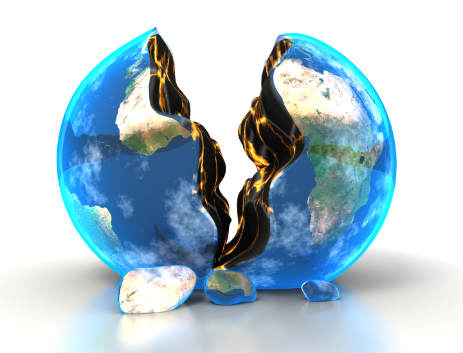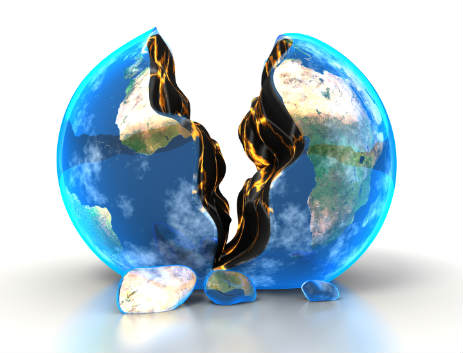The holidays are supposed to be the season of goodwill. But that has been in short supply over the past week and a half as governments and environmental groups blame each other for the disappointing outcome of the Copenhagen climate summit.
 Did the messy outcome at Copenhagen make it less likely that world governments can reach a deal next year in Mexico?The blame game began with Europe-based environmental groups pointing the finger at President Obama and the United States. Greenpeace International said the U.S. had “dragged the talks down,” while Christian Aid singled out Obama for special condemnation and decried rich countries’ “strong arm tactics and intransigence.” President Lula of Brazil joined in, blaming Obama for offering “too little” when it came to pledges to cut emissions.
Did the messy outcome at Copenhagen make it less likely that world governments can reach a deal next year in Mexico?The blame game began with Europe-based environmental groups pointing the finger at President Obama and the United States. Greenpeace International said the U.S. had “dragged the talks down,” while Christian Aid singled out Obama for special condemnation and decried rich countries’ “strong arm tactics and intransigence.” President Lula of Brazil joined in, blaming Obama for offering “too little” when it came to pledges to cut emissions.
Then it was China’s turn. Writing in The Guardian, UK energy and climate change secretary Ed Miliband condemned China for vetoing emission targets supported by “a coalition of developed and the vast majority of developing countries” and suggested the country had “hijacked” the negotiations. He was supported by the writer and journalist Mark Lynas, who had been at the heart of the bargaining as an adviser to the Maldives. Lynas took to The Guardian’s pages with a detailed, first-hand account of how the emerging superpower had “wrecked the talks, intentionally humiliated Barack Obama, and insisted on an ‘awful’ deal so that western leaders would walk away carrying the blame.”
China, predictably, hit back, calling Miliband’s comments “unfair and irresponsible” and accusing him of “trying to shirk the obligations of developed countries.” China had “performed no worse than any others,” its officials insisted.
Then the European Union weighed in, saying it was “obvious” that both China and the United States “did not want more than we achieved in Copenhagen.” It, in turn, was heavily criticized for joining U.S. opposition to the continuance of the Kyoto Protocol and for failing to rally other countries to ambitious emissions targets. Just about everybody blasted the Danes for their how they chaired the conference, while many identified widespread failures in the UN negotiating system, which British Prime Minister Gordon Brown called “at best flawed, at worst chaotic.”
If success has many fathers, as the saying goes, failure breeds a host of unpleasant, caught-out children, all trying to shift the blame to a sibling. And there is plenty to go around.
For what it is worth, China deserves most of it. It led the disruption in plenaries that made it impossible for the conference to get down to serious negotiating, took the targets out of the “accord” that finally resulted and has expressed more pleasure at the emasculated outcome than any other country.
The United States certainly made mistakes, particularly in its approach to China. But in the weeks preceding Copenhagen, the Americans moved quite far (despite political pressures from a wary Congress), and President Obama worked hard to rescue some sort of a deal at the actual gathering. The environmentalists’ failure to recognize this suggests that deep-seated anti-Americanism continues even after the departure of the much-loathed Bush administration. And though the EU should have taken more of a lead and was foolish to join in attempts to undermine the Kyoto Protocol, its leaders led the last-minute rescue missions in Copenhagen.
The Danes were undoubtedly not up to the job of charing the gathering. Indeed, the accord only won arms-length acceptance from the plenary after the Danish prime minister, Lars Løkke Ramussen, was quietly ejected from the chair. This type of situation probably won’t be a problem next December in Mexico, not least because a developing country will be presiding. And the shambolic failure of the UN system, not just in Copenhagen but over the whole of the last year (leading even one of its stalwarts, Malta’s Michael Zammit Cutajar, to confess “its tough to keep the belief in it”) is leading to an unprecedented drive for reform.
UN Secretary-General Ban Ki-moon announced he was setting up a “high-level panel” to see “how to streamline the negotiations process,” adding that he wanted to discuss “how we can do better” with governments and civil society. And that was just one sign of the most remarkable development of the last ten days. For even as the blame flew around, the key participants — far from taking refuge in it, and scaling down their commitments — were actually underlining their determination to do more.
Obama reemphasized his resolve to get a cap-and trade bill through Congress, insisting that clean energy will “drive economic growth for decades to come.” Gordon Brown said he would be stepping up efforts to get a climate treaty. And France’s Nicolas Sarkozy offered to host a summit this spring of the leaders that signed the Copenhagen accord, while Angela Merkel’s Germany will host a ministerial meeting in June.
Mexico pledged to press for the most controversial international commitment of all — a 50 percent global emissions cut by 2050 — as part of “a binding international agreement” under its chairmanship. Brazil announced it would stick to its own ambitious targets. India — whose celebration of the Copenhagen’s failure was second only to China’s — launched a plan for special “green economic zones.” And China announced new regulations to increase the use of renewable energy.
Welding all this into a new treaty remains a formidable task, probably more so than before the Copenhagen summit opened. But there is still much to work with, if only governments can start working together.
The first step is to move beyond the finger-pointing. As Yvo de Boer, the UN official in charge of the negotiations, pointed out last week: “These countries will have to sit down together next year, so blaming each other for what happened will not help.”



